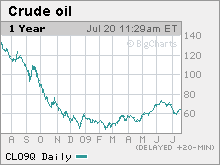Oil rises near $65
Futures edge higher amid optimism about the economy and a weaker U.S. dollar.
NEW YORK (Reuters) -- Oil touched a two-week high above $65 a barrel Tuesday as a slew of rosy corporate earnings reports fed into hopes for an economic recovery that could revive global energy demand.
U.S. crude gained 74 cents to settle at $64.72 a barrel Tuesday, after climbing to a two-week high of $65.53.
The rise in the oil market came as a raft of major companies, including Caterpillar Inc. (CAT, Fortune 500) and Merck & Co (MRK, Fortune 500). , reported stronger-than-expected results in the second quarter that many analysts took as a sign of economic improvement.
A recovery in the economy could bode well for world energy consumption, which shrank for the first time in a quarter century under the weight of the recession.
Weakness in the U.S. dollar also supported commodities markets, analysts said, in part by strengthening the purchasing power of buyers using other currencies.
"The (crude) market is trading more off the equities than the dollar, with the economic indicators and earnings lending support to sentiment," said Andy Lebow, a broker at MF Global in New York.
The front-month August U.S. contract expires at the close of trade Tuesday and will be replaced by the September contract, which slipped 15 cents to $65.14 a barrel.
Dealers said oil's gains were being kept in check by looming U.S. inventory data that could show a drop in crude stocks and increases in refined fuel supply.
The American Petroleum Institute will release its weekly figures at 4:30 p.m. ET, and the U.S. government's Energy Information Administration will release a separate report Wednesday morning.
"As long as the equities are gaining on the belief that the worst is over, then it also translates into higher consumer confidence, higher disposable income through the equity pick-up and that ultimately impacts demand," said Olivier Jakob of Petromatrix.
Oil stocks in industrialized countries equated to 62.5 days of demand cover at the end of May, according to the latest figures from the International Energy Agency -- around 10 days more than the Organization of the Petroleum Exporting Countries considers comfortable.
Algerian Energy and Mines Minister Chakib Khelil on Monday predicted prices would stay in a $65-$70 range this year as long as the market remained oversupplied and said OPEC could cut output when it next meets in September.
In OPEC member Iraq, oil supplies have been rising. Iraqi oil exports have averaged 2.08 million barrels per day (bpd) in July and could yet top the levels around 2.2 million bpd predating the 2003 ouster of Saddam Hussein, the head of Iraq's State Oil Marketing Organization said Tuesday.
Iraq is not subject to OPEC production quotas as it attempts to rebuild following years of war and sanctions. ![]()


